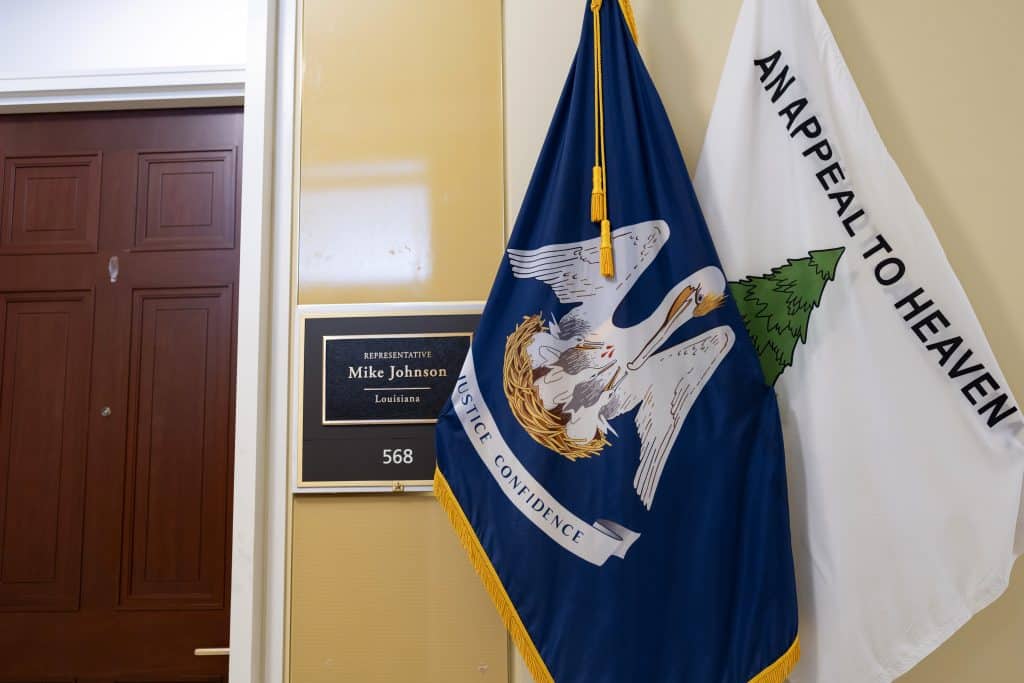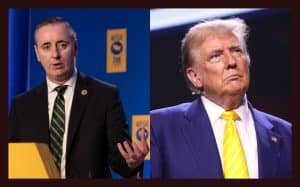After more than two decades of attacks from Christian Nationalists, the Johnson Amendment sustained perhaps its most substantive threat yet when the Trump administration in July indicated its intent to exempt houses of worship from this federal law that prevents nonprofit organizations from endorsing or opposing political candidates for public office.
The latest attempt to weaken the law came in a proposed settlement agreement to resolve a federal lawsuit filed against the Internal Revenue Service in August 2024. The IRS and the plaintiffs — the evangelical Christian organization National Religious Broadcasters; Intercessors for America, a Virginia-based, conservative Christian prayer ministry; and two Texas churches — filed a joint motion asking the court to approve the settlement and end the lawsuit.
Americans United immediately sought to defend the law and the separation of church and state. Three days after the settlement was proposed, AU filed a motion with the federal district court in Texas seeking to intervene — officially become a party — in the case. AU explained that intervention was necessary not only because the federal government had signaled it would not defend the law, but also because its proposed settlement would impermissibly treat houses of worship differently than secular organizations.
“We’re intervening in this case so we can urge the court to reject the administration’s latest gambit to rewrite the law,” said AU President and CEO Rachel Laser. “Americans United has long supported the Johnson Amendment because it protects the integrity of both our elections and nonprofit organizations, including houses of worship. Weakening this law would undermine houses of worship and nonprofits by transforming them into political action committees, flooding our elections with even more dark money.”
About the Johnson Amendment
The law is named after Sen. (and future president) Lyndon B. Johnson (D-Texas), who introduced the provision in Congress in 1954. It applies to tax-exempt nonprofits organized under section 501(c)(3) of the federal tax code — generally, organizations that have a charitable, educational, scientific, and/or religious purpose. Most houses of worship have 501(c)(3) tax-exempt status; so does Americans United.
The Johnson Amendment “doesn’t stop churches from … getting involved politically, from taking positions on issues, from abortion to wars to whatever it wants,” Laser said during a July interview on MSNBC’s PoliticsNation program hosted by the Rev. Al Sharpton. She joined Sharpton and the Rev. Dr. W. Franklyn Richardson, chairman of the conference of National Black Churches, to discuss the legal developments around the law.
“It doesn’t stop churches from mobilizing voters, from getting out the vote. It doesn’t stop clergy, in their personal capacity, from getting involved in elections,” Laser added. “What it says is, if you want the benefit of tax exemption, then charitable funds need to go to charitable work, not to partisan politics.”
For most of its existence, the Johnson Amendment has been uncontroversial and widely popular. It passed Congress without debate and with bipartisan support in 1954 before it was signed into law by Republican President Dwight D. Eisenhower. Over the past decade, public opinion research has consistently shown broad support for the law across political and cultural divides — including among Republicans, evangelical Christians and faith leaders.
Attacks on Johnson Amendment

But a handful of Christian Nationalists and their political allies began attacking the law in the early 2000s. In 2001, the late U.S. Rep. Walter B. Jones (R-N.C.) introduced a bill to repeal the Johnson Amendment; he’d go on to introduce a similar bill in nearly every two-year cycle of Congress until his death in 2019.
In 2008, the Christian Nationalist groups Alliance Defending Freedom and Family Research Council began organizing pastors to flout the law with events called “Pulpit Freedom Sundays.” Usually held in the fall shortly before the general election, they encouraged faith leaders to endorse candidates from the pulpit. U.S. House Speaker Mike Johnson (R-La.) supported the effort when he was an ADF attorney, prior to being elected to Congress. (Michael Farris, a former CEO of ADF, is the lead attorney for the National Religious Broadcasters in the current lawsuit.)
Other bills targeting the Johnson Amendment have been introduced over the years, some calling for repeal, some for exempting houses of worship, and some for weakening the law or making it harder to enforce. Identical bills were introduced earlier this year by U.S. Sen. James Lankford (R-Okla.) and U.S. Rep. Mark Harris (R-N.C.); their legislation would allow nonprofits to endorse or oppose candidates as long as the partisan political activity occurred during the course of an organization’s normal activities and didn’t incur more than minimal cost.
Those anti-Johnson Amendment bills have rarely gained any momentum. The closest Congress came to changing the law was during President Donald Trump’s first term in office. Trump began attacking the law while he was campaigning in 2016; he repeatedly has told the story of how he was dismayed to learn a group of evangelical pastors wouldn’t endorse him because they didn’t want to violate the law. That launched his call to, as he put it at the National Prayer Breakfast during his first month in office, “get rid of and totally destroy the Johnson Amendment.”
And yet, ultimately he and his allies in Congress failed to get rid of the law during his first term. Although Republicans in Congress tried to add provisions weakening the Johnson Amendment to several budget and tax bills during that term, the provisions were always stripped from the final bills. Trump also included language in a 2017 executive order that purported to scale back IRS enforcement of the law, but in actuality his order didn’t accomplish anything. His own Department of Justice had to confess in an August 2017 court filing that all the executive order did was require the law to be enforced equally against houses of worship and secular organizations.
“While the Trump Administration and its supporters launched high-profile attacks on the Johnson Amendment, Congress remained unmoved,” Americans United attorneys Alexandra Zaretsky, Jess Zalph and Rebecca Markert noted in an amicus brief filed in late July while AU’s intervenor status motion was pending. “Over the last several years in particular, Congress has had many opportunities to reconsider the Johnson Amendment … It has not done so.”
The brief goes on to explain how the Trump administration and the plaintiffs are trying to use the court to circumvent the democratic process: “Since neither the IRS nor the private Plaintiffs have the authority to override Congress’s determination, they now ask the Court to take this consequential step on their behalf … Permitting the Parties to bypass Congress would fundamentally undermine the balance of power among the three branches of government. Such a result is at minimum unreasonable and contrary to public policy, if not outright unconstitutional. Indeed, it raises the risk of improper collusion between the government and private parties to secure certain policy objectives.”
The court had not ruled on the settlement agreement or on Americans United’s motion to intervene in the case when this issue of Church & State went to press.
Nonprofits support the Johnson Amendment
Religious and secular nonprofits alike, including faith leaders, have been outspoken in their support for the Johnson Amendment. Over the course of Trump’s first term, more than 5,800 nonprofit organizations, 4,600 faith leaders and 106 religious and denominational organizations urged lawmakers to protect the law. Shortly after the IRS’s proposed settlement agreement was announced this summer, the nonprofit community joined together once again. AU and allies launched a national sign-on letter for nonprofits to voice their support for the Johnson Amendment; in just a few weeks, the initial launch in early August included more than 1,000 organizations.
“Nonprofits exist to serve the common good, not partisan politics,” said Diane Yentel, president and CEO of the National Council of Nonprofits. “Undermining the law that protects nonprofit nonpartisanship could severely damage the integrity and effectiveness of the entire nonprofit sector. Efforts by the administration and some in Congress to do so aren’t about religion or free speech, but about radically altering campaign finance laws and attempting to open the floodgates for political operatives to funnel money through churches while receiving generous tax breaks.”
“American democracy and our diverse religious communities benefit from healthy boundaries between government and religion,” said the Rev. Paul Brandeis Raushenbush, president and CEO of Interfaith Alliance. “It’s essential that our houses of worship remain outside the partisan fray, unbeholden to any political figure or group.”
“The Trump administration’s radical reinterpretation of this federal law is a flagrant, self-serving attack on church-state separation that threatens our democracy by plunging houses of worship into partisan battles,” AU’s Laser said. “AU is committed to fight the administration’s brazen ploy to use our houses of worship as political campaign tools.”
This article was originally published in the September 2025 issue of Church & State magazine, a project of Americans United for Separation of Church and State. It is reprinted here with permission.






